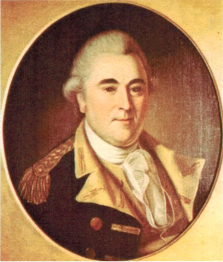Anthony Wayne: The Fiery General of the American Revolution and Frontier Statesman
Anthony Wayne, born on January 1, 1745, in Chester County, Pennsylvania, was an American military leader, statesman, and one of the key figures in the founding of the United States. Known for his bold tactics and unrelenting resolve, Wayne’s military prowess earned him the nickname “Mad Anthony” during the Revolutionary War. His legacy extends beyond the battlefield, as he played a significant role in shaping the early U.S. military and securing American interests on the western frontier.
Casey Adams
11/16/20243 min read


Early Life and Entry into the Military
Anthony Wayne grew up in a prosperous Pennsylvania family, with a strong education in surveying and engineering.
He initially pursued a career in land surveying, but his interest in military history and leadership led him to study warfare extensively.
With the outbreak of the American Revolutionary War in 1775, Wayne left his civilian life to join the Continental Army, driven by his passion for liberty and independence.
Wayne’s military career quickly took off, thanks to his determination, leadership, and willingness to take risks. By 1776, he was commissioned as a colonel in the Pennsylvania Line and soon rose to the rank of brigadier general due to his successful campaigns and fearless approach in battle.
Revolutionary War Achievements
His audacious tactics and unwavering courage marked Wayne’s contributions to the Revolutionary War. Among his most notable accomplishments:
• Battle of Brandywine (1777): Wayne fought valiantly during the British assault at Brandywine Creek, where his leadership helped delay British advances, allowing the Continental Army to regroup.
• Battle of Germantown (1777): He commanded a brigade in this bold but ultimately unsuccessful attack on British forces near Philadelphia.
• Battle of Monmouth (1778): Wayne’s steadfast performance under General George Washington helped secure a stalemate that boosted American morale.
His most famous exploit came during the Battle of Stony Point in 1779. In a daring nighttime assault, Wayne led a small force to capture the heavily fortified British position at
Stony Point, New York. The victory was a testament to Wayne’s boldness and meticulous planning, earning him widespread recognition and the admiration of General Washington.
The Nickname “Mad Anthony”
The moniker “Mad Anthony” originated from Wayne’s fiery personality and his fearless, sometimes reckless approach to battle.
While some viewed his aggressive tactics as risky, they often yielded significant victories. The nickname became a badge of honor, reflecting his tenacity and unyielding spirit.
Post-War Leadership: The Ohio Country Frontier
After the Revolutionary War, Wayne continued to serve the fledgling United States, taking on a vital role in securing the nation’s western territories.
In 1792, President George Washington appointed Wayne as the commander of the newly formed Legion of the United States, a reorganized U.S. Army tasked with defending settlers against Native American resistance in the Ohio Country.
Wayne’s most significant post-war achievement was his victory at the Battle of Fallen Timbers in 1794.
Facing a confederation of Native American tribes supported by the British, Wayne’s disciplined and well-trained Legion decisively defeated the opposition, paving the way for the Treaty of Greenville in 1795.
This treaty secured much of present-day Ohio for American settlement and marked a turning point in U.S.-Native American relations.
Statesman and Legacy
Anthony Wayne’s contributions extended beyond the military. As a statesman, he served briefly in the U.S. House of Representatives from Georgia, where he advocated for policies that supported the young nation’s growth.
Wayne’s legacy endures as a symbol of courage, determination, and strategic brilliance. His efforts not only helped secure American independence but also laid the groundwork for the nation’s westward expansion.
Anthony Wayne died on December 15, 1796, near Erie, Pennsylvania, while traveling back from a military post. He was buried with honors, and his contributions remain a proud chapter in American history.
Conclusion
Anthony Wayne’s life exemplifies the spirit of the American Revolution—unwavering in the face of adversity and steadfast in pursuit of liberty.
From his daring leadership in the Revolutionary War to his pivotal role on the western frontier, Wayne’s legacy as a soldier, officer, and statesman continues to inspire.
Known as “Mad Anthony” for his fiery zeal, he remains one of the great figures who helped shape the United States in its earliest days.
Anthony Wayne



